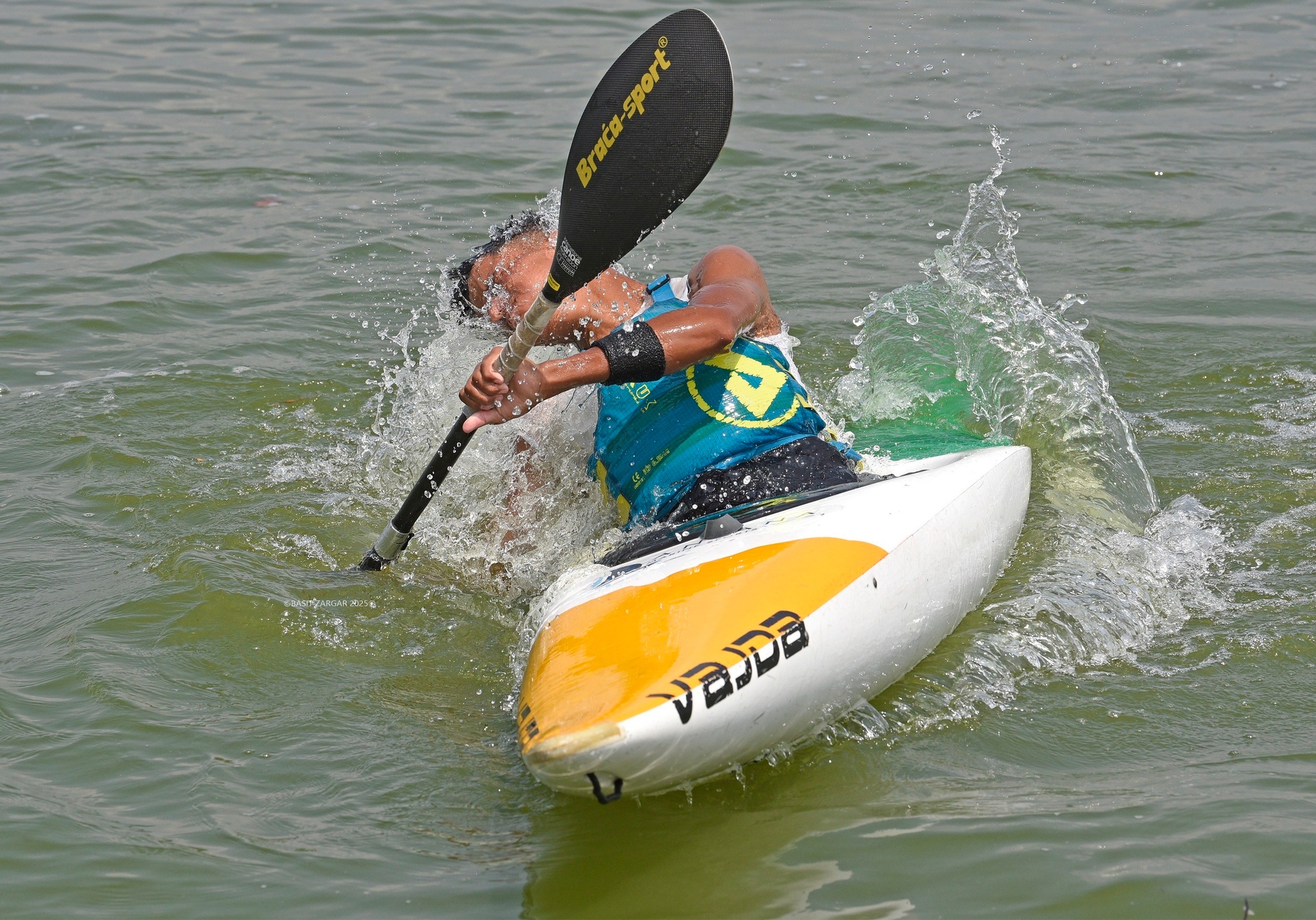By Ajaz Rashid
Srinagar: The calm, glistening waters of Dal Lake witnessed a rare transformation this week. For three days, from August 21 to 23, the lake—long celebrated for its shikaras, floating gardens and poetic reflection of the Zabarwan hills—turned into a sporting arena where adrenaline and elegance met rippling waves. The Khelo India Water Sports Festival (KIWSF) 2025, the first-ever national-level aquatic competition under the flagship Khelo India programme, concluded on Saturday, drawing curtains on an event that has already been described as “historic” and “the beginning of a new era” for water sports in India.
Organised jointly by the Sports Authority of India, the J&K Sports Council and the Ministry of Youth Affairs & Sports, the festival brought together hundreds of athletes, coaches, officials, and spectators in a vibrant celebration of sport and culture. Around 400–800 athletes from 36 states and Union Territories competed in medal events including rowing, canoeing, and kayaking, while water skiing, dragon boat racing and the much-anticipated shikara sprint added local flavour. Demonstration showcases further expanded the excitement, pulling crowds to the lake’s edges where cheers echoed against the mountains.
But the festival was not just about speed and medals. In the weeks leading up to it, authorities carried out clean-up campaigns and intensified deweeding operations, turning Dal Lake into a pristine sporting venue. That effort, officials said, reflected the event’s eco-friendly spirit—an acknowledgement that protecting the fragile ecosystem of Dal Lake is as important as hosting a world-class event upon it.
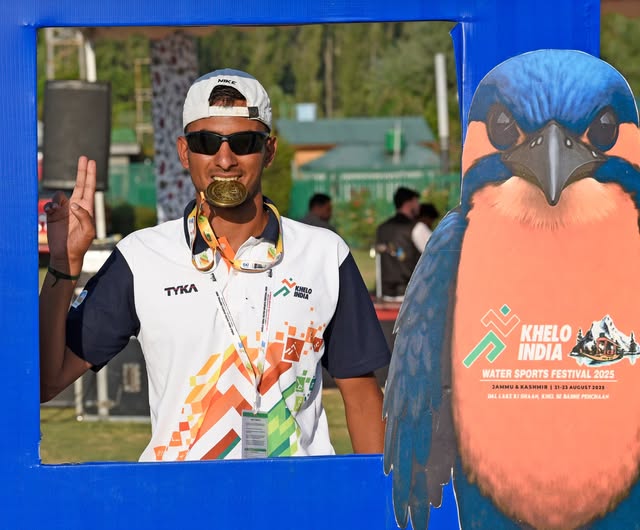
A new chapter for Kashmir sports
“This is not just an event, but the beginning of a new era for water sports in our country,” said Bilquis Mir, Olympic canoeing judge and one of the guiding figures behind water sports in Kashmir. Watching young athletes paddle through the blue-green waters, Mir said the festival would inspire a generation of rowers, kayakers and skiers.
For athletes like Mohsin Ali, a state champion from J&K who grew up paddling on Dal Lake, the festival felt personal. “This festival is a dream come true,” he said, visibly moved. “We have practiced here since childhood, but to see Dal hosting athletes from across the country—it is beyond what we imagined.”
Even locals who rely on Dal Lake for their livelihoods welcomed the event. A shikara operator who doubled as a water sports enthusiast said, “This festival will open new opportunities not only for sportspersons but also for those living around Dal. I want athletes to enjoy their visit and experience the vibrant life on Dal.”
The symbolism was not lost on organisers. By staging India’s first national-level water sports festival on Dal Lake, they aimed to mainstream aquatic athletics under the Khelo India initiative while positioning Srinagar as a hub for future events. Just as Gulmarg has emerged as India’s winter sports capital, Dal Lake is now being projected as the potential centrepiece of the country’s water sports landscape.
A closing rich with emotion
The closing ceremony, held at the Sher-e-Kashmir International Conference Centre (SKICC) on the lake’s banks, was as much about culture and unity as about sport. MLA Zadibal, Tanvir Sadiq, described the festival as a “historic moment” for Jammu and Kashmir. “The participation of athletes from across the country has not only showcased sporting talent but also enhanced the beauty of Dal Lake,” he said.
Sadiq, who had not been told beforehand he would speak, quoted the famous Persian verse, “Gar firdaus bar ru-e zamin ast, hamin ast-o hamin ast-o hamin ast,” evoking the Valley’s timeless grandeur. “When you came here, we locals realised how the outside world sees Kashmir. We have lived around this Dal all our lives, but when you athletes came and enhanced its beauty, you won one thing for sure—our hearts.”
He reminded the audience that hosting athletes from 32 states and UTs was no small feat. “As the local MLA of this area, I feel proud that Dal Lake—already world-renowned—today became a canvas where athletes from across India added their own beauty.”
But for Sadiq, the festival’s deeper significance lay in its power to unite. “India is home to 122 languages. From Tamil Nadu to Kerala to Rajasthan, people of different languages and cultures came together here, and that is the true beauty of our nation.”
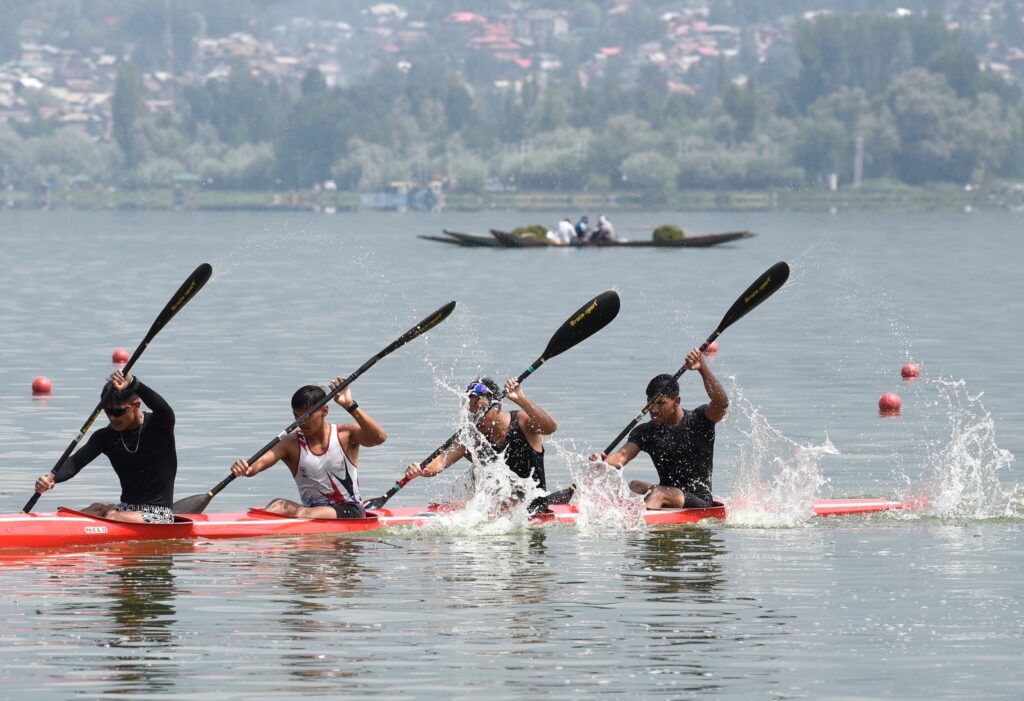
Looking ahead, he voiced a dream that one day a world champion in water sports might emerge from Dal Lake itself. “This festival is the start of that dream,” he said, urging athletes to return not just for competitions but as tourists. “This time you came as athletes, but next time, please come as tourists—we need you in that role too.”
The promise of a sports capital
Minister for Youth Services and Sports, Satish Sharma, echoed this optimism, declaring that Jammu and Kashmir could well become the “Water Sports Capital of India.” At the closing ceremony, Sharma lauded the performances of teams from J&K, Madhya Pradesh, Odisha, Kerala and beyond.
“This festival not only showcased sporting excellence but also reflected how sports inspire us, unite us and help build a stronger and healthier society,” Sharma said. He described athletes as the “ambassadors of peace, prosperity and love,” thanking parents and coaches for their dedication.
In a significant political pitch, the Minister urged the Government of India to extend a special sports package for border areas of J&K. “Locals there defend the nation without wearing uniforms and deserve equal opportunities,” he argued. He also pledged to push for more national-level events in the Valley, saying such gatherings allow athletes to carry Kashmir’s message of peace and brotherhood across the country. “With your blessings, I assure you J&K will surely become the Water Sports Capital of India,” Sharma said.
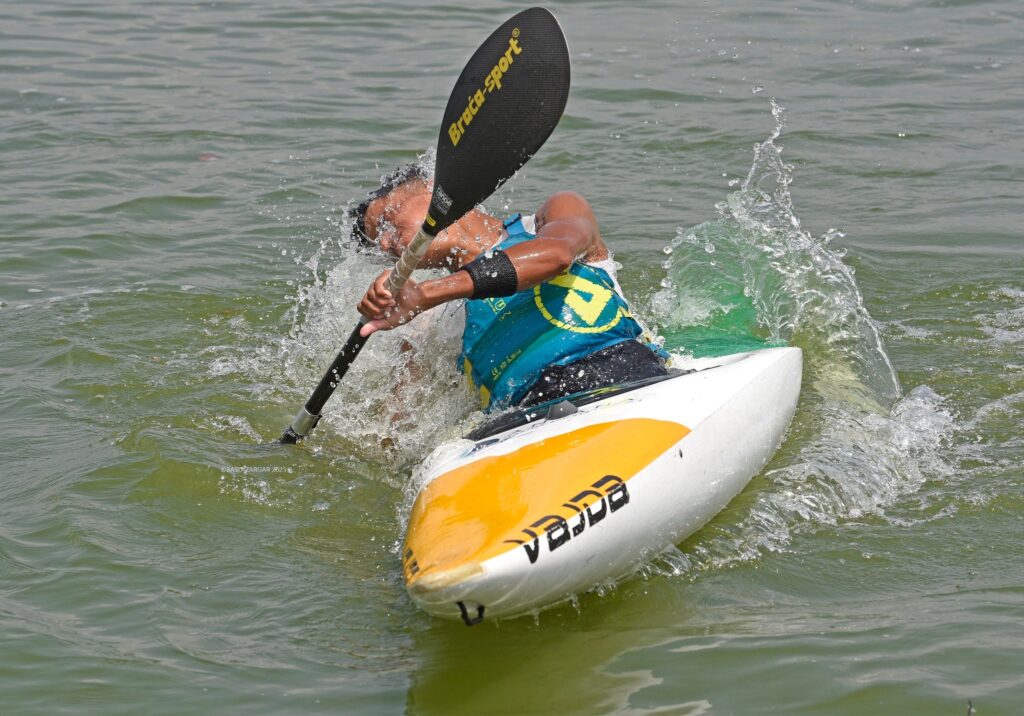
More than medals
As the sun set behind the Zabarwan hills on Saturday evening, shikaras decorated with flowers ferried athletes back from the venue, their laughter mingling with Kashmiri folk music. For many, the festival was not just about competition but about connection—between athletes and locals, between nature and sport, between Kashmir and the rest of India.
For three days, Dal Lake became more than a postcard image of Kashmir. It was a theatre of ambition, resilience, and celebration. The sound of paddles cutting water, the sight of dragon boats racing, the cheers from banks crowded with schoolchildren and tourists—all of it combined to script a chapter that will likely be remembered for years to come.
In the words of Bilquis Mir, the festival’s real legacy will be the inspiration it leaves behind. “One day,” she said, “the waves of Dal will carry champions who make not just Kashmir, but India, proud.”
For now, as the waters of Dal returned to their usual serenity, the echoes of the Khelo India Water Sports Festival lingered—waves of glory indeed. (With inputs from KNO)
Dal Lake Boys Bring Glory to J&K
Three young athletes from the interiors of Dal Lake—Mohsin Ali, Sajad Hussain and Muhammad Hussain—have scripted history for Jammu and Kashmir at the Khelo India Water Sports Festival (KIWSF) 2025, turning their humble beginnings into a story of resilience and triumph.
At the national stage, Mohsin bagged gold in the K-1 1000-metre men’s kayaking event, while Sajad clinched silver in the C-2 500-metre canoe slalom. Muhammad Hussain added to the tally with a silver in the C-2 canoe 500 metres men and a bronze in the C-1 canoe 1000 metres men. Together, their victories lifted J&K to a commendable seventh place among 28 competing states and Union Territories.
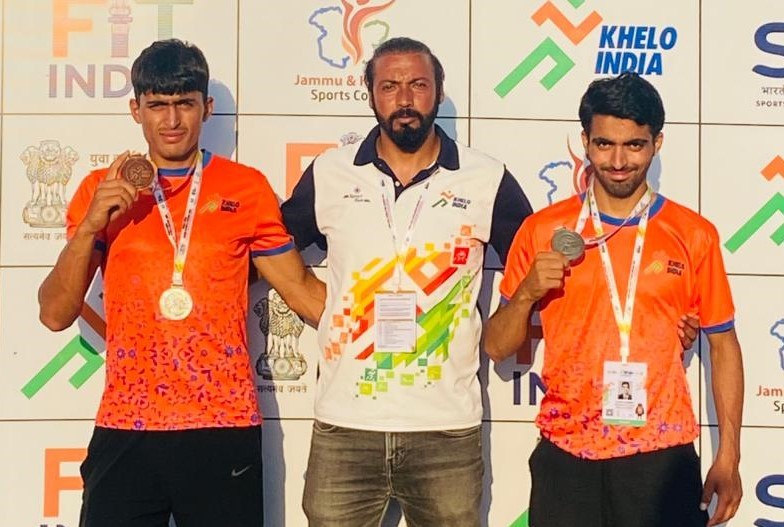
Behind the medals lies a journey of grit and struggle. All three belong to families battling financial hardships, yet their determination, coupled with the support of the Sports Authority of India (SAI), kept their sporting dreams alive. The SAI Centre at Nehru Park, nestled in the waters of Dal Lake, has become a lifeline for young athletes in the region, offering not just professional training but also unwavering mentorship.
Sajad recalls how their coach, Zulfkar Ali Bhat, went beyond the role of a trainer. “When we trained early mornings at Nehru Park, sir would drop us to school afterward. We would change into our uniforms inside his car,” he said with a smile.
A shikarawallah’s son, Sajad admits it wasn’t easy to pursue canoeing, an endurance sport demanding both strength and nutrition. “Proper diet is essential, and with limited means at home, it was a struggle. But SAI gave us the support we needed,” he said.
Muhammad Hussain echoed the sentiment. “If we were left to train on our own, excelling would have been impossible. The SAI centre gave us the opportunity to dream big,” he said, adding that sports also provide an alternative to the menace of drug addiction among Kashmiri youth.
Mohsin Ali, who won gold, said he too had to balance training with helping his family survive. “I rowed a shikara to support my household. Without SAI’s facilities and guidance, this medal would have remained a dream,” he admitted.
Coach Zulfkar Ali Bhat believes the achievements of his wards are just the beginning. With India’s ambitious bid for the 2036 Olympics, he says the Nehru Park centre is preparing a long-term talent pool to put Kashmiri athletes on the global water sports map.
For now, Dal Lake—long seen as a symbol of Kashmir’s beauty—is also becoming a symbol of its sporting promise, thanks to boys who refused to let adversity sink their dreams.
